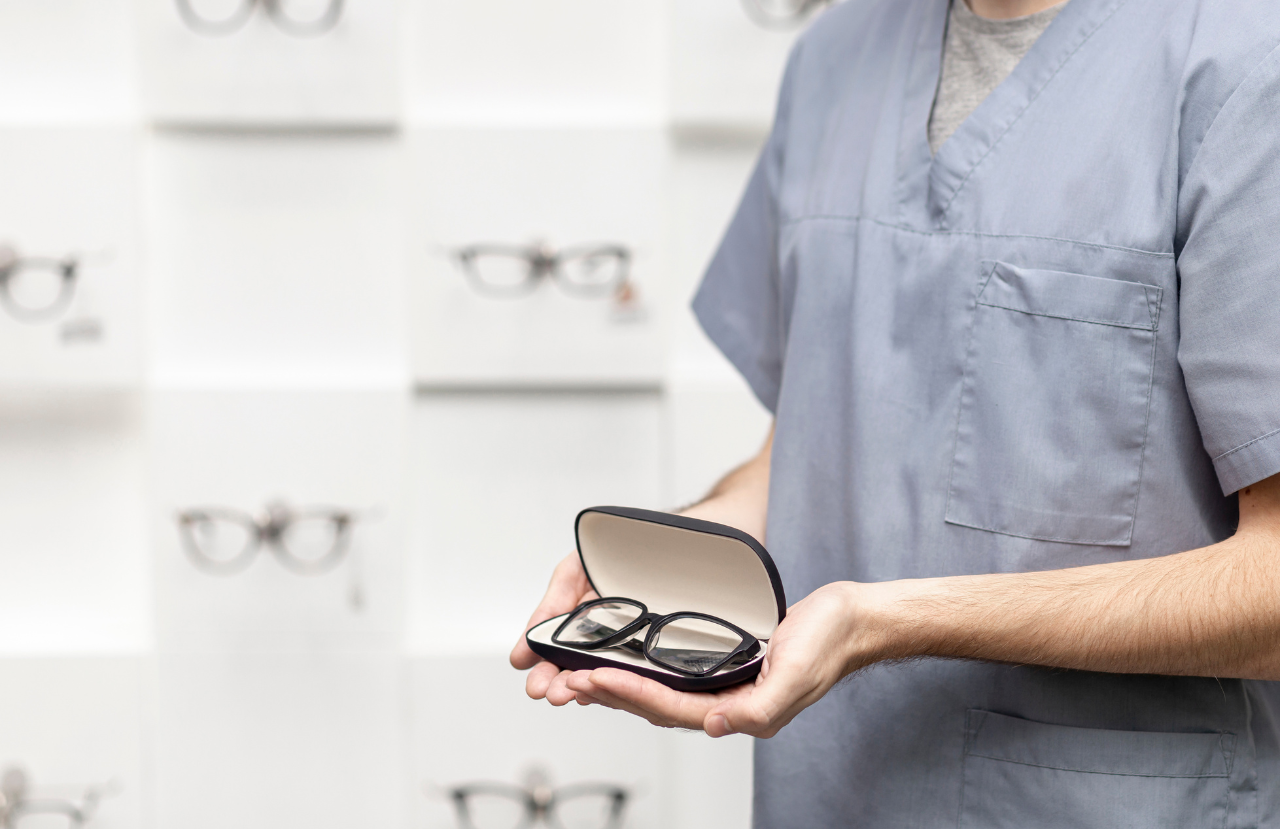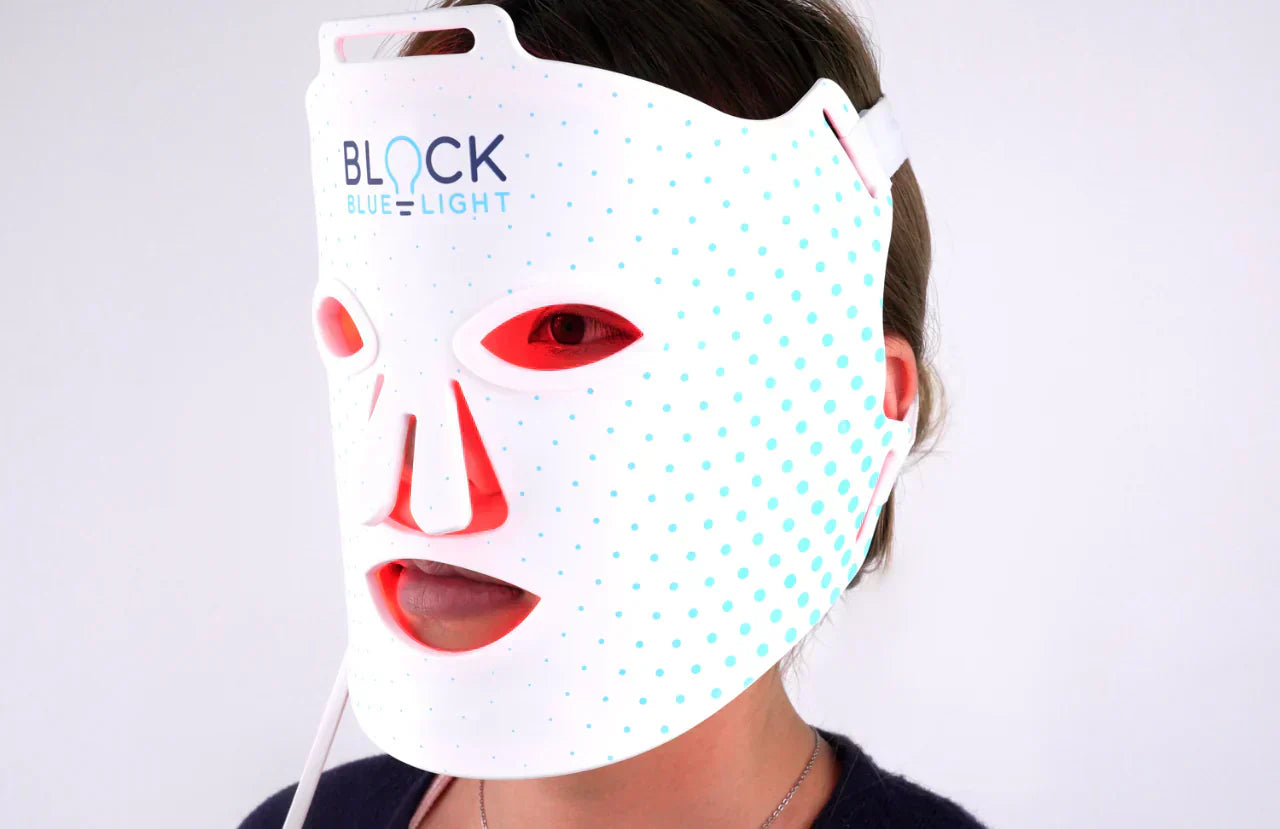Jump to the section
- What are blue light glasses without prescription and why should I wear them?
- How do blue light glasses without prescription work?
- Is it okay to wear blue light glasses (without prescription) all day?
- Can I get prescription blue light glasses?
- Buying checklist for blue light glasses without prescription
- FAQs
Blue light glasses are glasses designed for use with screens and digital devices. They have many benefits - they eliminate digital eye strain, improve sleep, prevent migraines & eye aches and even reduce the risk of eye diseases such as macular degeneration. But can you wear blue light glasses without prescription? The answer is yes; you do not need a prescription to use blue light glasses.
Blue light glasses are safe for kids and adults, without consulting an eye doctor. This is because blue light glasses simply protect your eyes from the harmful rays emitted by digital devices. They don’t change your vision.
In this article, we’ll explain everything you need to know about why you can wear blue light glasses without prescription and how these glasses work.
What are blue light glasses without prescription and why should I wear them?

Have you ever looked at the screen time report on your phone? It’s 6 hours on a good day and 8 hours on a bad day! There’s no need to feel guilty. It’s the same with all of us. If you add the time on your laptop and the occasional TV-watching, you may look at screens for 9+ hours a day. Reducing screen time seems impossible. We have to work on our laptops and use our phones for constructive tasks such as connecting with friends and reading books.
However, our eyes aren’t designed for extreme screen-exposure. Our ancestors spent most of their day out in the sun. So what happens when we’re exposed to digital devices for long?
The answer is blue light overdose. You see, screens emit all colours of light (light is made of the colours of the rainbow), but they primarily emit blue light. Blue light has the highest energy in the spectrum. Overexposure to blue light leads to symptoms you may have experienced, such as;
- Digital eye strain.
- Dry eyes
- Watery eyes
- Head, neck and eyeaches
- Sleeplessness
- Blurred vision
- Fatigue
Secondly, blue light is a zeitgeber. A zeitgeber is any external or environmental cue that synchronizes our biological processes such as digestion, sleep and hormones with the earth’s day and night. Blue light signals to our body it’s daytime. So if you use screens after sunset, your mind stays alert, making it difficult for you to fall asleep. In the long run, this causes sleep problems.
Enough about the disadvantages of blue light! You’re probably wondering; how do I solve this issue.
The answer is; blue light glasses. And you don’t need a prescription to wear them!
How do blue light glasses without prescription work?
Blue light glasses have a filter on the lens which reflects blue light to bounces off. They also have a unique pigment inside the lens to absorb the peak wavelength of blue light.
ScreenTime glasses block the 50% of blue light and DayMax glasses block the 70% of blue light. This is because some blue light ( the natural light of the sun) is needed to synchronize your body’s processes according to the 24-hour cycle. Daytime blue light glasses aim to block the excess light from artificial sources that are responsible for digital eye strain and headaches.
Meanwhile, nighttime blue light glasses block 100% of blue light. After the sun sets, any exposure to blue light upsets your body’s sleep cycle.

Is it okay to wear blue light glasses (without prescription) all day?
Yes, wearing blue light glasses all day is recommended to make the most of them. Keep them on while you’re surrounded by artificial light or if you’re using screens. Just be careful to not wear evening or night blue light glasses during the day. These red or amber-tint glasses have a strong blue-light shield and wearing them during the day can make you sleepy.

Can I get prescription blue light glasses?
Yes. The good news is that you can have your usual prescription glasses made with blue light protection. If you have weak eyesight, simply upload your prescription file from a recent eye exam with your desired frame style and checkout. Learn more about how prescription glasses work and how to order them, here. Now you don’t have to wear an uncomfortable clip-on for blue-light protection on your glasses!
Buying checklist for blue light glasses without prescription
All blue light glasses are not created equal! There are thousands of glasses online that you’ll feel no difference after using. This is because their lenses don’t filter the correct wavelengths of blue light.
Here's what you need to confirm before buying a pair of blue blockers;
Determine your lens colour
The lens colour depends on whether you’re buying glasses for day or night.
Day glasses are clear or yellow and have a mild filter, while night glasses are red or amber and have a strong filter. Read our lens colour guide to determine which lens you need.
Ask for a transmittance spectrum report/spectrophotometer report
A transmittance spectrum report is a scientifically accurate report depicting the wavelengths being filtered by a lens. Regular light is shined through the lens, and the light coming from the other end is measured and displayed in the report. This report displays the ‘wavelength’ that is filtered by the lens. It also displays the ‘percentage’ of light filtered at that range. For example, has blue light been filtered by 10%? By 50%? Or by 100%?
- What should the report display for day blue light glasses?
Check that the 300-500 nm range is filtered by at least 50% if you’re buying daytime glasses. If the glasses filter any less than 50% (say 10% or 20%, you won’t see any difference after using them)

- What should the report display for night blue light glasses?
100% of blue light should be blocked in the 300-550nm range. This range includes turquoise light because recent research has proven that turquoise light also inhibits melatonin production and reduces sleep quality. Any lesser protection than this an you won’t experience the benefits.

Ensure they protect against the peak wavelength of blue light at 425nm.
This is the range where most of the damage occurs. BlockBlueLight’s glasses have a special pigment to protect at this range.
When you’re buying products that affect your health, you can never be too careful. The light entering your eyes affects your eyesight, hormones, mood, appetite and sleep patterns. That’s why it’s important that you do research and buy research-backed prescription glasses that filter blue light.
At BlockBlueLight, we understand this and design all our products to work with your body and in line with nature. All our blue light glasses are individually tested by a lab-grade spectrophotometer, and the report is attached to the product descriptions.
Still have questions? Refer to our FAQs or find your answers in our detailed blog!
FAQs
Can I wear blue light glasses if I don't need glasses?
Yes, you can wear blue light glasses even if you don’t have weak eyesight and don’t have a prescription. Blue light glasses protect your eyes from the harmful effect of blue light that digital devices and LED lighting emits, thus eliminating digital eye strain and improving your sleep.
Can a normal person wear blue light glasses?
Yes, even if you don’t have weak eyesight (prescription glasses), you should wear blue light glasses for protection against the blue light wavelengths in digital screens and LED lighting. Blue light glasses have nothing to do with weak eyesight.
Who can wear blue light glasses?
Anyone who spends time using digital screens should consider wearing blue light glasses, especially if they’re experiencing digital eye strain. This includes children too. If you’re experiencing sleep problems you should consider wearing blue light glasses even if you’re not using screens often. This is because blue light is present in LEDs and fluorescent lights which also affects us the way screens do.
When should you not wear blue light glasses?
You can wear blue light glasses all day, as long as you’re using teh correct type of glasses. Night time blue light glasses (tinted red or amber) shouldn’t be worn during the day. They’re constructed for use after sunset and they promote good sleep. Wearing them during the day (when we should be exposed to sunlight) may cause you to become drowsy.
References
https://explodingtopics.com/blog/screen-time-stats#:~:text=Of%20Screen%20Time-,Average%20Screen%20Time%20Stats%202022,at%20a%20screen%20each%20day.







